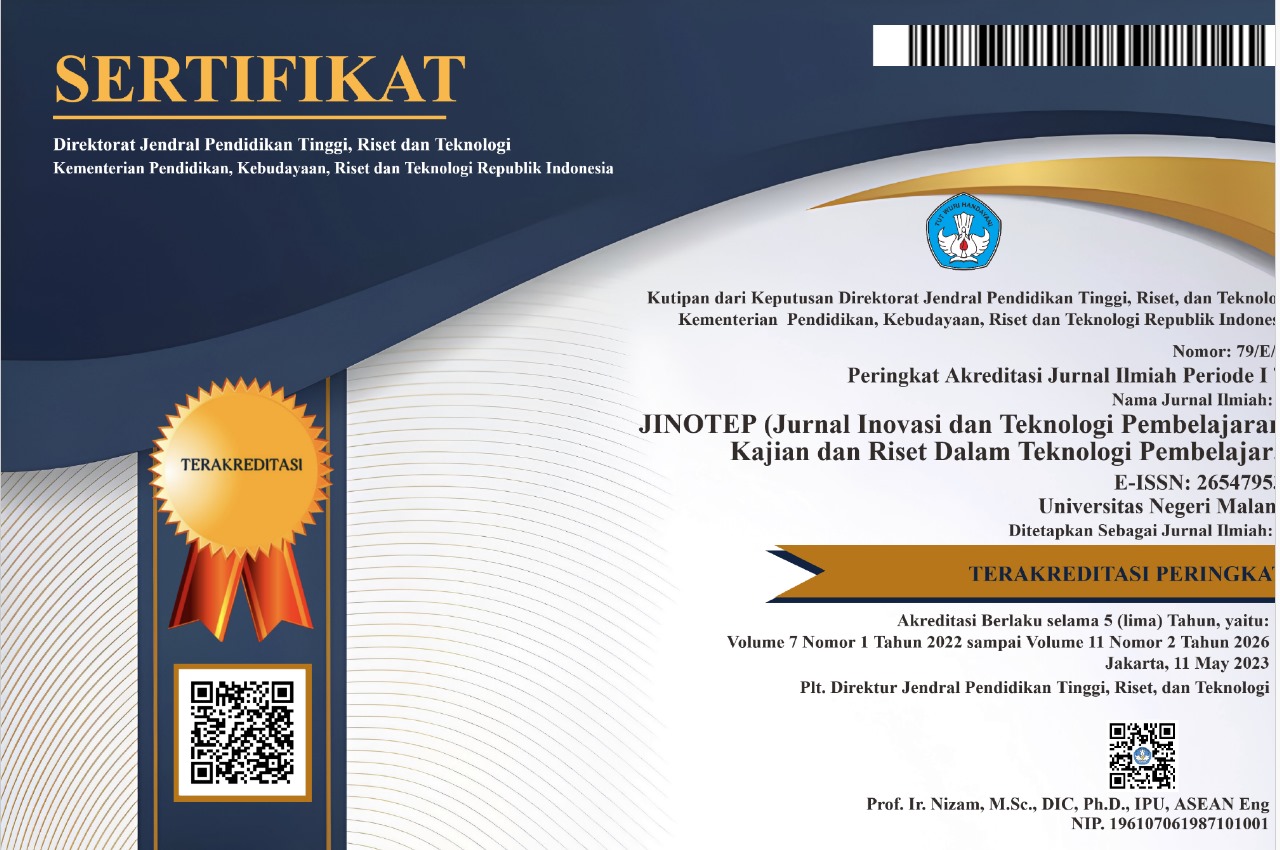The Development of HOTS Worksheet for Sixth-Grade Elementary School Students in Learning English
Abstract
Abstrak: Penelitian ini bertujuan untuk mengembangkan lembar kerja siswa yang berbasis berpikir kritis tingkat tinggi menggunakan kurikulum tingkat satuan pendidikan pada siswa sekolah dasar kelas enam semester satu. Penelitian ini menggunakan metode D&D dengan ADDE model. Peneliti menggunakan observasi, analisis dokumen, kuisioner, interview, dan penilaian ahli saat proses pengumpulan data. Guru dan siswa sekolah dasar adalah partisipan dalam penelitian ini. Temuan penelitian ini menunjukan bahwa berpikir kritis tingkat tinggi masih kurang di aplikasin untuk kurikulum ktsp, lembar kerja yang dikembangkan oleh peneliti dinyatakann sangat baik dalam membantu siswa sekolah dasar dalam belajar bahasa Inggris.
Abstract: This research aimed to develop students’ worksheet based on higher order thinking skills using the kurikulum tingkat satuan pendidikan on sixth-grade elementary students at the first semester. This research used D&D method with ADDE model. The instrument that was used by the researcher namely observation, document analysis, questionnaire, interview and expert judgement in collecting the data. The participants were the teacher and students from the elementary school. The findings manifested that higher order thinking skills is less conducted through the kurikulum tingkat satuan pendidikan, the worksheet that is developed by the researcher help the elementary students and it was considered excellent by the expert for teaching English.
Keywords
Full Text:
PDFReferences
Anderson, L. W., & Krathwohl, D. R. (2001). A taxonomy for learning, teaching, and assesing. New York: Addison Wesley Longman, Inc.
Ary, D. J. (2010). Introduction to Research in Education. Belmont: WADSWORTH CENGAGE Learning.
Aisah, H., Mansur, A. S., & Yulianti, Z. Q. (2020). Jurnal Ilmiah IJGIE International Journal Of Graduate Of Islamic Education. International Journal of Graduate of Islamisc Education, 1(2), 96–115.
Ali, Z. (2018). A Case Study on Collaborative Learning to Promote Higher Thinking Skills (HOTS) among English as a Second Language (ESL) Learners. Jurnal UMP: Social Sciences and Technology Management, 1(1), 1–14. http://umpir.ump.edu.my/5069/
Antika, R. R. (2014). Proses Pembelajaran Berbasis Student Centered Learning. BioKultur, III(1), 251–263.
Doǧan, Y., & Sezer, G. O. (2010). A study on learning environments of elementary school students taking social studies course: Bursa sample. Procedia - Social and Behavioral Sciences, 2(2), 1356–1361. https://doi.org/10.1016/j.sbspro.2010.03.200
Heong, Y. M., Yunos, J. M., Othman, W., Hassan, R., Kiong, T. T., & Mohamad, M. M. (2012). The Needs Analysis of Learning Higher Order Thinking Skills for Generating Ideas. Procedia - Social and Behavioral Sciences, 59, 197–203. https://doi.org/10.1016/j.sbspro.2012.09.265
Kurniawati, T., & Tasman, A. (2021). Implementasi Tes Mata Pelajaran Ekonomi Berbasis HOTS. 4(1), 142–148.
Kwangmuang, P., Jarutkamolpong, S., Sangboonraung, W., &
Daungtod, S. (2021). The development of learning innovation to enhance higher order thinking skills for students in Thailand junior high schools. Heliyon, 7(6), e07309. https://doi.org/10.1016/j.heliyon.2021.e07309
Mintre, R., & Lie, A. (2020). Higher Order Thinking Questions in Teaching Reading in a Private Primary School. Beyond Words, 8(1), 36–46. http://journal.wima.ac.id/index.php/BW/article/view/2092
Misrom, N. S., Abdurrahman, M. S., Abdullah, A. H., Osman, S., Hamzah, M. H., & Fauzan, A. (2020). Enhancing students’ higher-order thinking skills (HOTS) through an inductive reasoning strategy using geogebra. International Journal of Emerging Technologies in Learning, 15(3), 156–179. https://doi.org/10.3991/ijet.v15i03.9839
Mubarok, H., & Anggraini, D. M. (2020). Literation Skill To Improve Higher-Order Thinking Skills In Elementary School Students. Al-Bidayah: Jurnal Pendidikan Dasar Islam, 12(1), 31–42. https://doi.org/10.14421/al-bidayah.v12i1.234
Nachiappan, S., Damahuri, A. A., Ganaprakasam, C., & Suffian, S. (2018). Application of Higher Order Thinking Skills (Hots) in Teaching and Learning Through Communication Component and Spiritual, Attitudes and Values Component in Preschool. International Journal of Early Childhood Education and Care, 7(December), 24–32.
Nadhiroh, N., & Latifah, S. (2020). Higher Order Thinking Skills (HOTS)-Based Students’ Worksheets in Thermodynamics Materials. Indonesian Journal of Science and Mathematics Education, 3(1), 87–95. https://doi.org/10.24042/ijsme.v3i1.6082
Ningsih, T., Praherdhiono, H., & Wedi, A. (2018). Pengaruh Model Pembelajaran Think Pair Share Dalam Sistem Pembelajaran Blended Terhadap Higher Order Thinking Skills. JINOTEP (Jurnal Inovasi Dan Teknologi Pembelajaran) Kajian Dan Riset Dalam Teknologi Pembelajaran, 4(2), 88–94. https://doi.org/10.17977/um031v4i22018p088
Nofrion, N., & Wijayanto, B. (2018). Learning Activities in Higher Order Thinking Skill (Hots) Oriented Learning Context. Geosfera Indonesia, 3(2), 122. https://doi.org/10.19184/geosi.v3i2.8126
Purnama, S., Faelasofi, R., Al-munawwarah, S. F., & Suardi, I. (2020). Development of English Teachers Oriented Higher Order Thinking Skills ( Hots ) In Elementary School of Madrasah Ibtidaiyah ( MI ). 12(2), 3581–3590.
Putra, H. D., Herman, T., & Sumarmo, U. (2017). Development of Student Worksheets to Improve the Ability of Mathematical Problem Posing. International Journal on Emerging Mathematics Education, 1(1), 1. https://doi.org/10.12928/ijeme.v1i1.5507
Shala, A. (2016). Formal and Non-Formal Education in the New Era. June 2016.
Singh, C. K. S., Singh, R. K. A., Singh, T. S. M., Mostafa, N. A., & Mohtar, T. M. T. (2018). Developing a Higher Order Thinking Skills Module for Weak ESL Learners. English Language Teaching, 11(7), 86. https://doi.org/10.5539/elt.v11n7p86
Susanti, A., Retnaningdyah, P., Ayu, A. N. P., & Trisusana, A. (2020). Improving EFL Students’ Higher Order Thinking Skills Through Collaborative Strategic Reading in Indonesia. International Journal of Asian Education, 1(2), 43–52. https://doi.org/10.46966/ijae.v1i2.37
Turan-Özpolat, E. (2020). A Phenomenographic Study on Views About Entertaining and Boring Situations in Learning Process. International Education Studies, 13(10), 8. https://doi.org/10.5539/ies.v13n10p8
Vijayaratnam, P. (2012). Developing Higher Order Thinking Skills and Team Commitment via Group Problem Solving: A Bridge to the Real World. Procedia - Social and Behavioral Sciences, 66, 53–63. https://doi.org/10.1016/j.sbspro.2012.11.247
Yennita, Y., Khasyyatillah, I., Gibran, G., & Irianti, M. (2018). Development of worksheet based on high-order thinking skills to improve high-order thinking skills of the students. Journal of Educational Sciences, 2(1), 37. https://doi.org/10.31258/jes.2.1.p.37-45
Zubaidah, S. (2016). Keterampilan abad ke-21: keterampilan yang diajarkan melalui pembelajaran. December 2016.
DOI: http://dx.doi.org/10.17977/um031v8i32021p216
Refbacks
- There are currently no refbacks.
Copyright (c) 2021 Ni Kadek Rai Sintia Putri, Putu Kerti Nitiasih, Luh Gd. Rahayu Budiarta, Ni Luh Putu Era Adnyayanti, I Nyoman Adi Jaya Putra

This work is licensed under a Creative Commons Attribution-ShareAlike 4.0 International License.
======================================================================
Jurnal Inovasi dan Teknologi Pembelajaran published by Universitas Negeri Malang in collaboration with the Asosiasi Program Studi Teknologi Pendidikan Indonesia (APS TPI) and Ikatan Profesi Teknologi Pendidikan Indonesia (IPTPI) with a MoU.
Publisher Address:
Educational Technology Laboratorium, Building D5, 1st Floor
Faculty of Education, Universitas Negeri Malang
Semarang St. No. 5, Malang City, East Java Province, Postal Code 65145
Email: jinotep.fip@um.ac.id
======================================================================

JINOTEP is licensed under a Creative Commons Attribution-ShareAlike 4.0 International License.
JINOTEP Statistics (Since July 13th, 2020)



.png)




.png)
1.png)
1.png)
4.png)
2.png)
1.png)
1.png)
.png)


_3.png)





1.png)
.png)